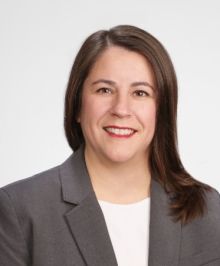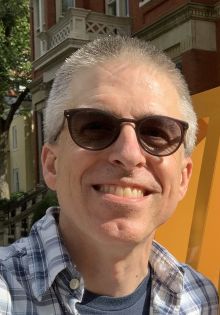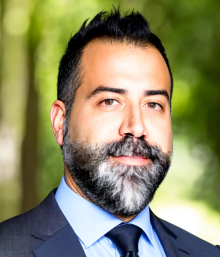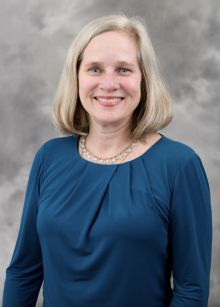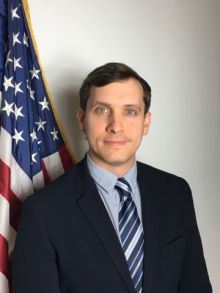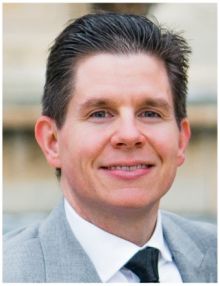 Staff
Staff
Erika Rissi - Chief Evaluation Officer and Evaluation and Assessment Capability Section Head
Talk to me about
- Merit Review studies, reports, and pilots.
- PI and reviewer customer experience surveys.
- NSF’s Learning Agenda and annual evaluation plan.
- Integrating strategy, planning, and measurement.
Biography
Ms. Erika Rissi is the Chief Evaluation Officer and Evaluation and Assessment Capability Section Head at NSF where she leads policy analyses to study and develop evidence-based recommendations for enhancing the NSF merit review process. She is also responsible for development of the agency’s learning agenda and annual evaluation plan, ensuring that evidence-building activities are focused on the most pressing questions to help NSF advance its mission.
Rissi has held numerous positions at NSF that brought together her experience in strategy design, strategy execution, and operations. She oversaw the strategy for modernizing NSF's legacy proposal and award management processes and systems and was the business lead for Research.gov. She designed and led a process for creating an agency reform plan, "Renewing NSF," that incorporated ideas generated through agency-wide brainstorming sessions. And she developed surveys administered to 100,000 NSF customers to measure satisfaction, identify end-user critical IT needs, and evaluate changes to NSF’s process for the merit review of proposals.
Prior to joining NSF, Rissi held positions as a strategy management consultant with firms focused on public sector clients, including Grant Thornton, SRA International, and Touchstone Consulting Group, where she advised C-level executives on grants management and policy, human capital, financial management, and agency management and operations. She earned a bachelor's degree in music from Yale University.
Greg Anderson - Senior Advisor for Strategy and Evaluation
Talk to me about
- Merit review process and policies.
- Interdisciplinary and convergence science program design and oversight.
- Advisory, oversight, and governance boards and committees.
Biography
Dr. Greg Anderson is senior advisor for strategy and evaluation at NSF. Since joining NSF in 2009, he has served in multiple roles, leveraging his expertise in multidisciplinary Earth science, major facility oversight and planning, and managing complex scientific programs.
Anderson has been responsible for multidisciplinary and convergence research programs; overseen two of NSF’s major facilities and one independent center; participated in multiple agency-wide groups focused on NSF’s merit review process, workforce, and facilities oversight; and has been a member of interagency groups on natural hazards, Earth-observing satellite needs, and Arctic sciences. He served for three years as co-Executive Secretary for the National Science Board Subcommittee on Facilities and Committee on Awards and Facilities and 18 months as Section Head for Integrated Activities in the Division of Earth Sciences. More recently, Anderson co-led a cross-NSF group that developed a decision support tool to assist agency staff and leadership in choosing an appropriate funding model for complex cross-organizational activities. He currently represents NSF as co-chair of the steering committee for the Interagency Arctic Research Policy Committee’s 2023-2025 Biennial Implementation Plan. Prior to joining NSF, he held positions at the University of California, San Diego, U.S. Geological Survey, UNAVCO, and the Swiss Federal Institute of Technology in Zürich. He has a doctorate in Earth sciences from the University of California, San Diego.
Brent Fraser - Evaluation and Monitoring Systems Lead
Talk to me about
- EAC-managed data sources.
- Data collection and management.
- Data-informed decision making.
Biography
Mr. Brent Fraser is the lead for evaluation and monitoring systems in EAC. He oversees all technical aspects of the Education and Training Application (ETAP) and EAC enterprise analytics, including coordinating across NSF to realize the vision of NSF by the Numbers. He is an accomplished leader in decision science, program management, and systems engineering with over 20 years of federal experience in the Department of Defense, United States Postal Service, and now, NSF. His expertise includes decision science, data visualization, systems modeling and analysis, and program management.
Fraser holds a master’s degree in industrial and systems engineering from Virginia Tech and a bachelor’s degree in industrial engineering from the University of Arkansas. He is a licensed professional engineer and a certified project management professional.
Edric Grullon - Program Analyst (Acting)
Biography
Mr. Edric Grullón serves at EAC as a program analyst (acting) from the NSF's Budget Division front office, where his role as a Management Analyst emphasizes strategic management, budget formulation, and advocacy. His contributions are aimed at bolstering operational efficiency and ensuring strategic alignment with the NSF's overarching objectives. Prior to this detail, Grullón applied his expertise for 15 years in the insurance sector as an auditor, prioritizing high standards in auditing, customer service excellence, and adaptability within dynamic business landscapes.
His educational achievements include earning a master’s degree in Museum Studies and Cultural Heritage Management from Johns Hopkins University. This foundation has enhanced Grullón's skills and deepened his understanding of the vital role cultural institutions play in promoting community engagement and accessibility.
Laura Lunsford - Evaluator
Talk to me about
- Mentoring in STEM.
- Merit review process.
- Capacity assessment.
Biography
Dr. Laura Lunsford is an evaluator at NSF and a research affiliate at Campbell University, known for her expertise in evaluation, leadership, and mentoring within STEM fields. Her contributions extend globally, including her role as a U.S. Fulbright Scholar in Germany, where she studied the initiation of mentorship in a STEM-focused online, global talent development program for highly gifted youth.
Lunsford has written over 50 peer-reviewed articles, case studies, and chapters on leadership and mentoring. She was a member of the National Academies of Science, Engineering, and Mathematics consensus committee that authored one of their most downloaded reports, “The Science of Effective Mentorship in STEMM.” She has presented at top conferences in her field, including at the American Psychological Association, the International Leadership Association, the International Mentoring Association, and the American Educational Research Association.
Prior to working at NSF, she was a tenured professor of psychology and assistant dean at Campbell University and a tenured associate professor at the University of Arizona. She has significant administrative experience, having worked at the North Carolina School of Science and Mathematics, and served in director roles at Duke University’s Fuqua School of Business, University of North Carolina Wilmington’s Cameron School of Business, and at North Carolina State University. Lunsford earned her doctorate from North Carolina State University in applied social and community psychology.
Christopher Monk - Portfolio Manager
Biography
Mr. Christopher Monk is the portfolio manager for EAC, where he monitors portfolio progress and performance and promotes EAC’s organizational planning and goals. Prior to joining EAC in 2022, Monk worked at the U.S. Department of Health and Human Services in the Office of the National Coordinator for Health IT (ONC), where he was the oversight operations lead for the ONC Health IT Certification Program. He also worked previously as an NSF science assistant for the Graduate Research Fellowship Program and as a clinical project manager for safety net clinics in Northern Virginia. Monk earned his master's in biomedical sciences jointly from George Mason University and Georgetown University.
Farzana Ramzan - Evaluator
Talk to me about
- Evaluation design, methods, and use.
- Impact and outcome metrics.
- Skilled technical workforce analysis.
- PI and reviewer customer experience surveys.
Biography
Dr. Farzana Ramzan is a social scientist and evaluator at the NSF, with expertise in monitoring, evaluation, research, learning, and program management. Prior to NSF, Ramzan served in senior technical positions at the U.S. Agency for International Development and the U.S. Department of Agriculture. She provided leadership and guidance for measuring, monitoring, and evaluating the impact of the U.S. government’s global programs, and in the assessment of policies and programs across disciplines and sectors. Ramzan also led projects that explored the application of machine learning methods for accelerating the generation, synthesis, and use of scientific evidence in government programs.
Ramzan was the recipient of a competitive fellowship to study at the University of Manchester, where she earned her doctorate in Development Policy and Management concentrating in sociology. She was a research associate at the Sokoine University of Agriculture (Tanzania), and a visiting research student at the University of Wisconsin (Madison). Ramzan also completed a professional certificate program in data science at Georgetown University and taught sociological theory and methods at the City University of New York.
M. Taylor Rhodes - Evaluator
Talk to me about
- Econometric methods.
- Theories of change / logic models.
- Data management.
Biography
Dr. M. Taylor Rhodes is an evaluator at NSF. He has extensive experience in the areas of program evaluation, research and data analytics, and econometric methods. At NSF, Rhodes is a technical representative for research efforts, performs quality assurance reviews, and examines technical skills and training interests. He has held previous federal positions at the U.S. Department of Labor, U.S. Department of Treasury, and U.S. Department of Agriculture and academic positions at Oregon State University, University of Nevada at Las Vegas, College of Coastal Georgia, Lawrence University, and Bennett College. Rhodes has a doctorate in economics from the University of North Carolina at Greensboro and his research has been published in World Nutrition, Public Health Nutrition, Food Protection Trends, and American Economist.
Cecilia Speroni - Evaluator
Talk to me about
- NSF’s Education and Training Application (ETAP).
- NSF’s STEM workforce / human capital development programs.
- Broadening participation.
- Rigorous evaluation designs, such as experimental and well-matched quasi-experimental designs.
Biography
Dr. Cecilia Speroni is an evaluator at NSF and a research affiliate at the University of California, Santa Barbara. At NSF, she supports various evidence-building activities, including leading the development and pilot testing of a data collection system designed to support NSF's human capital development programs.
Prior to NSF, Speroni was a senior researcher at the company Mathematica for 10 years, where she designed and led large-scale impact evaluations in K-12 and higher education for federal agencies, state government agencies, and foundations. She also served as the deputy director of STEM research, where she helped manage the research portfolio. Prior to her tenure at Mathematica, she worked at the American Institutes for Research and the Community College Research Center on a wide range of education policy topics, including the high school-to-college transition, bilingual education and adequacy, and equity in education financing.
Speroni's evaluations of human capital development include approaches to connect workers with training opportunities, high school curricula to improve college access, and college summer enrichment programs for minority students to diversify the workforce in health and science fields. She is a certified reviewer of the Institute of Education Sciences’ "Find What Works" clearinghouse to assess the quality of empirical studies, and her research has been published in top peer-reviewed journals such as American Economic Review (Papers and Proceedings), Journal of Labor Economics, and Labour Economics.
Speroni earned her doctorate with distinction from Columbia University in economics and education.

